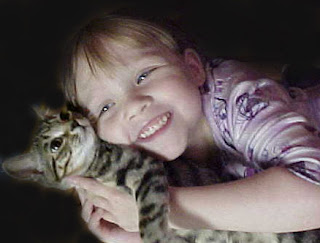While this blog is mostly about crunchy parenting, it is also about the crunchy home.
Intactivism is not just for humans in my opinion, it should extend to animals as well. Animals should be not mutilated with unnecessary surgery and amputations such as declawing and docking. This is a strong statement I am aware. I am also aware of the other side, much like the circumcision side. “It never hurt a cat I have had” and “it’s normal to do to these animals for the last such and such years” and “my vet said it was ok” and “I can’t teach my cat (son) to scratch (clean) the right areas” and so on.
For the love of the cat please research this. Know the facts! Like how 52.4% of declawed cats were reported to exhibit litter box avoidance, compared to 29.1% of non-declawed cats. Declawed cats seem to lose their homes BECAUSE they were declawed! There is evidence that declawed cats are disproportionately abandoned to shelters, and that declawed cats may be euthanized more often because of the behavioral and physical problems that the cat begins to exhibit because the cat was declawed. – http://www.pawproject.org/faqs/
You might say that there is a different surgery that does not amputate the cats claws (Actually fingers!) that is not as bad.
Laser declawing causes less bleeding and swelling than other surgical techniques. This reduces pain and complications in the first few days after surgery, but the long-term consequences of the procedure remain the same.
Long term effects have not been shown to lesser with tendonectomy and have the added risk of the unretractable claws still growing and if not trimmed often they will grow circular and into the cats paw pads. . Because of its complications, tendonectomy may lead to declawing anyway. Although tendonectomy is not actually amputation, a 1998 study published in the Journal of the American Veterinary Medical Association found the incidence of bleeding, lameness, and infection was similar for tendonectomy and declawing. The human society does not support it. http://
Infact in many countries it is illegal, and many places like the ASPCA do not support any kind of declawing.
In England declawing is illegal. It is regarded as animal abuse. Other countries where declawing is either illegal or is not routinely performed unless under extreme circumstances are Australia, Austria, Belgium, Bosnia, Brazil, Denmark, England, Finland, France, Germany, Ireland, Israel, Italy, Malta, Netherlands, New Zealand, Northern Ireland, Norway, Portugal, Scotland, Slovenia, Sweden, Switzerland, Wales, and Yugoslavia. The list continues to grow.
Against declawing are the ASPCA, Humane Society of the United States, Massachusetts SPCA, Denver Dumb Friends League, San Francisco SPCA, SPCA of Texas, and the Animal Welfare League (Chicago, IL, the Midwest’s largest humane society). The SPCA of Los Angeles puts it in no uncertain terms: “We do NOT support, nor condone, the act of declawing cats. It is cruel, unnecessary, and inhumane.” The Cat Fancier’s Association, the world’s largest pedigreed cat registry, opposes declawing as “without benefit to the cat” and involving “post operative discomfort or pain, and potential future behavioral or physical effects.”
In 2006, the USDA – normally an extremely conservative federal agency – amended the Animal Welfare Act to prohibit declawing of exotic carnivores, saying that it “can cause considerable pain and discomfort to the animal and may result in chronic health problems.”
In 2007, the California Court of Appeals upheld a ban on declawing enacted by the city of West Hollywood, CA, in 2003.
In April 2007, the city of Norfolk, Virginia outlawed declawing.- http://www.sniksnak.com/cathealth/declaw.html
In short, the risks are many, from the physical to the very common behavioral.
While there can be medical reasons, near all cases I have seen are from owners who are not educated and choose an unnecessary surgery over training their cats and taking other responsible steps to insure quality of life for everyone in the home.
I would normally say I could always be wrong at this point. I honestly though do not believe declawing a healthy cat should be an option in our society, I think we should know better by now.
Hug your little ones, and your fluffy ones close, declawed or not, and vow to do what you always do, the very best for them.

